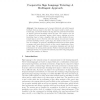Free Online Productivity Tools
i2Speak
i2Symbol
i2OCR
iTex2Img
iWeb2Print
iWeb2Shot
i2Type
iPdf2Split
iPdf2Merge
i2Bopomofo
i2Arabic
i2Style
i2Image
i2PDF
iLatex2Rtf
Sci2ools
136
click to vote
ESAW
2009
Springer
2009
Springer
Cooperative Sign Language Tutoring: A Multiagent Approach
Sign languages can be learned effectively only with frequent feedback from an expert in the field. The expert needs to watch a performed sign, and decide whether the sign has been performed well based on his/her previous knowledge about the sign. The expert’s role can be imitated by an automatic system, which uses a training set as its knowledge base to train a classifier that can decide whether the performed sign is correct. However, when the system does not have enough previous knowledge about a given sign, the decision will not be accurate. Accordingly, we propose a multiagent architecture in which agents cooperate with each other to decide on the correct classification of performed signs. We apply different cooperation strategies and test their performances in varying environments. Further, through analysis of the multiagent system, we can discover inherent properties of sign languages, such as the existence of dialects.
Related Content
| Added | 26 May 2010 |
| Updated | 26 May 2010 |
| Type | Conference |
| Year | 2009 |
| Where | ESAW |
| Authors | Ilker Yildirim, Oya Aran, Pinar Yolum, Lale Akarun |
Comments (0)

